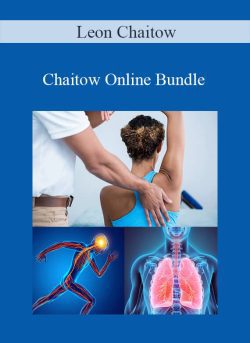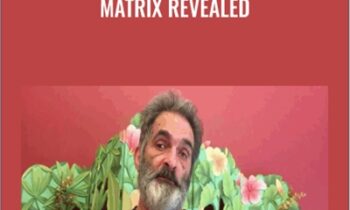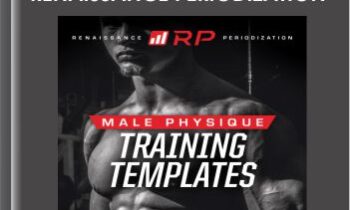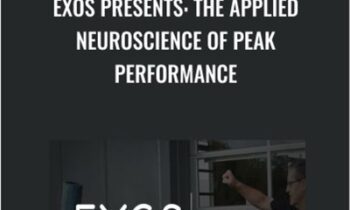$997.00 Original price was: $997.00.$279.00Current price is: $279.00.
Digital Download: You will receive a download link via your order email
Save up to 85% compared to Salepage prices. In addition, earn additional points. Save more on your next order.
Please contact email: wixzip.cs@gmail.com if you have any questions about this course.
 Purchase this course you will earn 279 Points worth of $27.90
Purchase this course you will earn 279 Points worth of $27.90Elevate your skills with the Leon Chaitow – Chaitow Online Bundle course, available for just $997.00 Original price was: $997.00.$279.00Current price is: $279.00. on Utralist.com! Browse our curated selection of over 60,000 downloadable digital courses across diverse Health and Medical. Benefit from expert-led, self-paced instruction and save over 80%. Start learning smarter today!
 Leon Chaitow – Chaitow Online Bundle
Leon Chaitow – Chaitow Online Bundle
Fascial Treatment and Assessment Methods
If you are working on soft tissue and muscles, you are also working on fascia. You do not treat fascia, you treat the body, but by nature the fascia is implicated as is it is connected to everything and everything to it. Learning more about fascia allows you to perform treatments in a more effective manner. Because the body responds differently to pressure on a cellular level, it is important to understand the reactions caused by varying forces of pressure.
This course discusses the fascia and how to treat disorders of its function. You will learn the latest understanding relating to the anatomy and physiology of fascia. Dr. Chaitow explains the elements that make up fascial behavior including fluid dynamic aspects and the effects of treating the tissues. The course will cover selected Fascial Modalities each addressing a different therapeutic approach to the treatment of fascial dysfunction. The information presented builds on a background of what is now known or hypothesized in relation to fascial dysfunction and its repercussions for physical activity.
Compiled and edited by an internationally respected author, practitioner and teacher, by completing this course you will have the background research, knowledge base and the most effective manual therapy approaches for restoring or improving fascial function. The therapies discussed are all supported by research and relevant clinical evidence is summarized for each modality allowing you to immediately apply it in your practice and see results.
Muscle Energy Technique (MET)
Muscle Energy Technique may have been discussed by several healthcare providers and teachers in manual therapy, but never like the way explained by Dr. Leon Chaitow. Dr. Chaitow discusses the advances of this effective manual therapy technique and provides you with his multi-year experience treating thousands of patients along with his treatment wisdom in a way that you can totally understand and put into practice immediately.
This is a valuable course for physiotherapists, manual therapists, physical therapists, osteopaths, osteopathic physicians and chiropractors, massage therapists, structural integration practitioners, Pilates and yoga teachers & therapists, Tai chi and Feldenkrais practitioners, athletic coaches and voice-coaches.
Course Description
In this practical, evidence-informed, course the participants will acquire and/or enhance use of Muscle Energy Techniques (MET) for application to articular, fascial and myofascial dysfunction.
The course will explore the rationale and methodology for using different models of MET, in their role in managing a variety of forms of somatic dysfunction.
- Isometric (standard) MET
- Slow eccentric MET as used in post-trauma rehabilitation
- Pulsed (rhythmic) MET – applied to spinal and pelvic articulations
Video demonstrations include functional assessment methods for associated soft tissue as well as spinal and pelvic articular dysfunction, together with demonstration and explanations of MET application to these tissues and structures.
Breathing Pattern Disorder
Disordered breathing patterns may be a symptom or a cause of frequently undiagnosed health problems. A significant proportion of the population worldwide suffers from breathing pattern disorders, particularly in the more developed countries. Accordingly, a wide range of practitioners encounter these problems, often without having received any prior training in their causation or management.
This course is intended to help practitioners, manual therapists and all healthcare professionals understand the causes and effects of disordered breathing and to provide strategies and protocols to help restore normal function.
This is a valuable course for physiotherapists, manual therapists, physical therapists, osteopaths, osteopathic physicians and chiropractors, massage therapists, structural integration practitioners, Pilates and yoga teachers & therapists, Tai chi and Feldenkrais practitioners, athletic coaches and voice-coaches.
Disordered breathing patterns may be a symptom or a cause of frequently undiagnosed health problems. A significant proportion of the population worldwide suffers from breathing pattern disorders, particularly in the more developed countries. Accordingly, a wide range of practitioners encounter these problems, often without having received any prior training in their causation or management.
This course is intended to help practitioners, manual therapists and all healthcare professionals understand the causes and effects of disordered breathing and to provide strategies and protocols to help restore normal function.
This is a valuable course for physiotherapists, manual therapists, physical therapists, osteopaths, osteopathic physicians and chiropractors, massage therapists, structural integration practitioners, Pilates and yoga teachers & therapists, Tai chi and Feldenkrais practitioners, athletic coaches and voice-coaches.
Delivery Method
Be the first to review “Leon Chaitow – Chaitow Online Bundle” Cancel reply
Cultivate continuous growth with the Leon Chaitow – Chaitow Online Bundle course at Utralist.com! Unlock lifetime access to premium digital content, meticulously designed for both career advancement and personal enrichment.
- Lifetime Access: Enjoy limitless access to your purchased courses.
- Exceptional Value: Benefit from savings up to 80% on high-quality courses.
- Secure Transactions: Your payments are always safe and protected.
- Practical Application: Gain real-world skills applicable to your goals.
- Instant Accessibility: Begin your learning journey immediately after buying.
- Device Compatible: Access your courses seamlessly on any device.
Transform your potential with Utralist.com!
Related products
Health and Medical
= 35 Points
Health and Medical
= 29 Points
Health and Medical
= 43 Points
Health and Medical
EXOS Presents: Advanced Strength and Power Featuring Dan Baker
= 53 Points
Health and Medical
= 28 Points
Health and Medical
“Male Physique Training Templates” – Renaissance Periodization
= 42 Points
Health and Medical
MyBeliefworks for Pain Relief, Chronic, Pre Op/Post Op to Pain-free Recovery – Jimmy Mack
= 25 Points
Health and Medical
= 43 Points




 Leon Chaitow – Chaitow Online Bundle
Leon Chaitow – Chaitow Online Bundle








Reviews
There are no reviews yet.